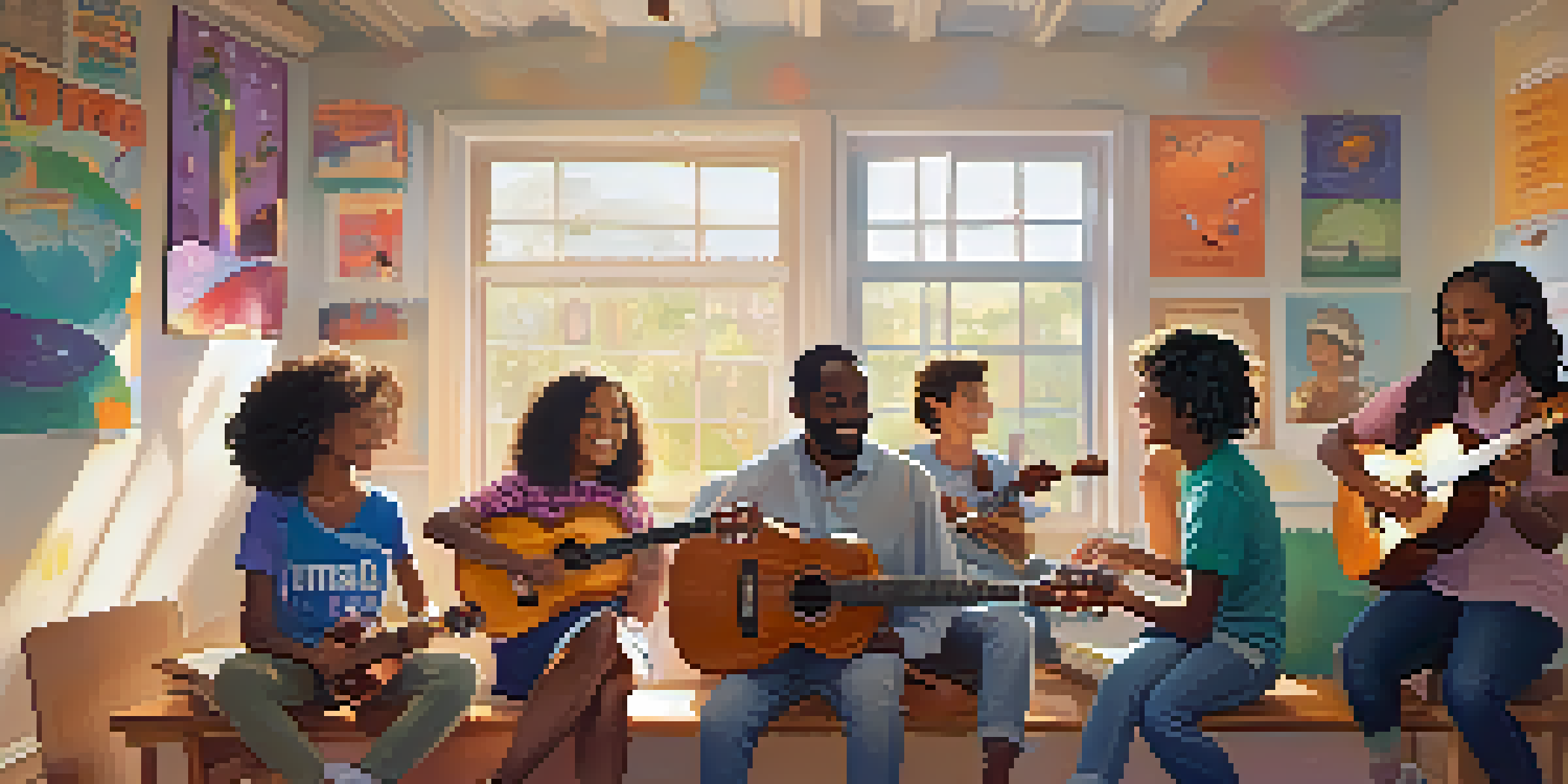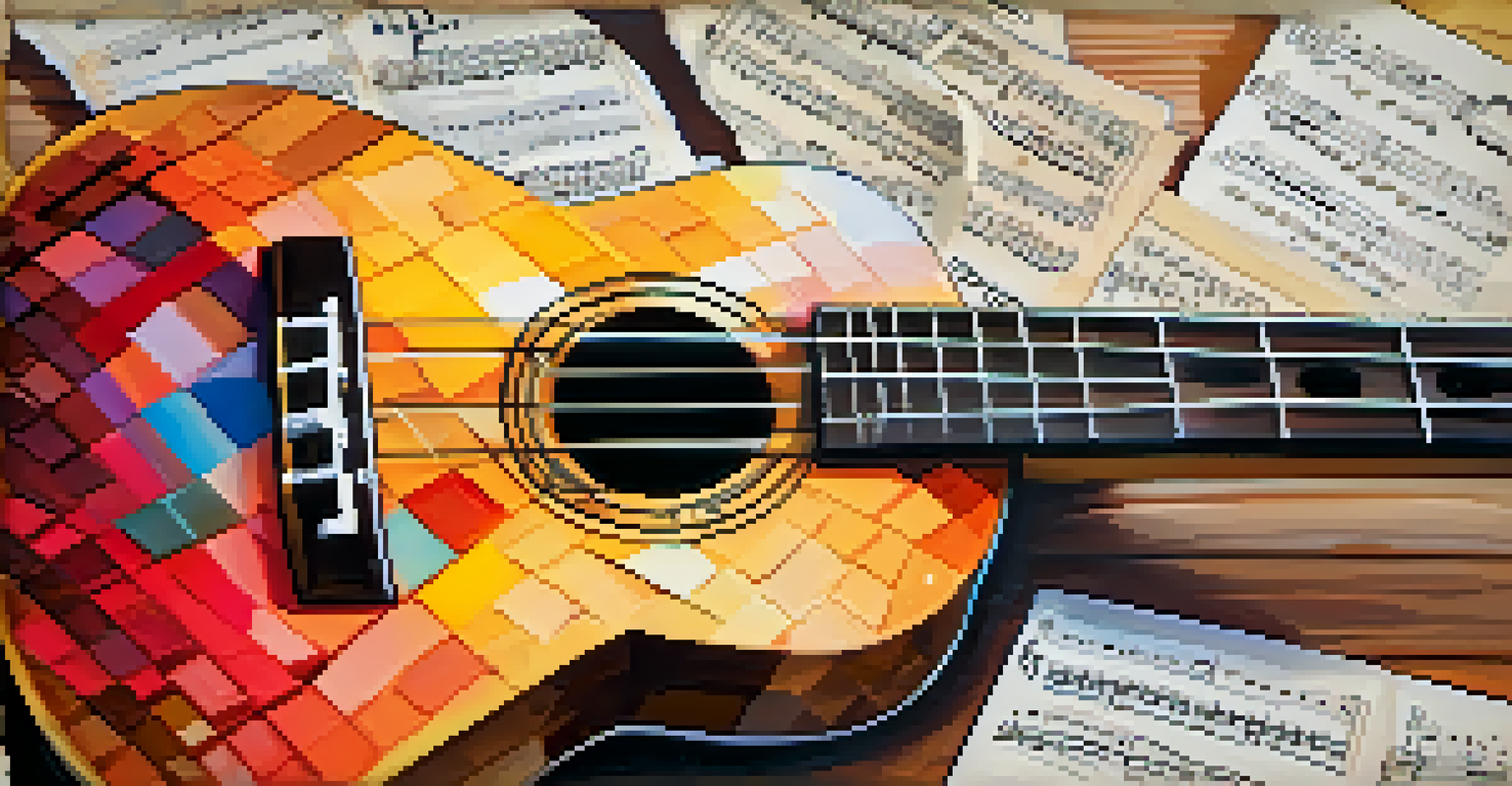Using Ukuleles to Foster Creativity in Music Education

The Ukulele: A Gateway Instrument for Beginners
The ukulele is often seen as an ideal starting instrument for budding musicians. Its small size and light weight make it easy for children to handle, which can boost their confidence as they learn. Additionally, the ukulele has only four strings, making it simpler to grasp basic chords compared to other string instruments. This accessibility can foster a love for music that might lead to exploring more complex instruments later on.
Music is the shorthand of emotion.
With its cheerful sound and bright tones, the ukulele can quickly create a positive and engaging atmosphere in the classroom. Imagine a group of students strumming along, their faces lighting up as they play their first song together. This instant gratification can spark the desire to continue learning and experimenting with different musical styles. The versatility of the ukulele means it can be used in various genres, from traditional Hawaiian tunes to pop and folk music.
By incorporating the ukulele into music education, teachers can encourage students to express themselves creatively. Whether it's through songwriting or improvisation, the ukulele serves as a tool that invites exploration. As students gain confidence in their abilities, they often feel inspired to make music that reflects their unique perspectives.
Enhancing Group Collaboration Through Ukulele Play
Playing the ukulele in a group setting can significantly enhance collaboration among students. When they learn to play together, students develop important social skills, such as communication and teamwork. They must listen to each other and adjust their playing to create a harmonious sound, fostering a sense of community. These experiences can lead to lasting friendships built on shared musical interests.

Moreover, group ukulele sessions allow for a variety of roles to emerge, whether it's a lead singer, a rhythm keeper, or a solo performer. This encourages students to take initiative and contribute to the group creatively. As they rotate through different roles, they gain a deeper understanding of music composition and arrangement. This not only builds their musical skill set but also their confidence in working collaboratively.
Ukulele Boosts Confidence in Beginners
The ukulele's simplicity and approachable nature make it an ideal instrument for beginners, fostering a love for music.
Collaborative play can also lead to creative projects, such as composing original songs or arranging popular tunes. These projects encourage students to express their individuality while working towards a common goal. The ukulele's simplicity allows for quick experimentation, making it easier for students to share and develop their ideas together.
Fostering Individual Creativity with Ukulele Composition
One of the most exciting aspects of playing the ukulele is its ability to inspire individual creativity. Students can explore their own musical ideas by experimenting with chords and melodies, ultimately leading to the creation of original songs. The ukulele's approachable nature means that even beginners can feel empowered to compose, making music education a more personal experience.
The beautiful thing about learning is that no one can take it away from you.
Encouraging students to write their own songs allows them to express their thoughts and emotions through music. This process not only enhances their understanding of musical structure but also helps them develop a unique artistic voice. Sharing these original creations with peers can foster a supportive environment where creativity is celebrated and nurtured.
Furthermore, songwriting can be integrated into lessons in various subjects, such as storytelling in language arts or themes in history. By connecting music with other areas of learning, students can deepen their understanding of both subjects while cultivating creativity. The ukulele becomes a bridge that links multiple disciplines, enhancing the overall educational experience.
Instilling a Sense of Achievement with Ukulele Progress
Learning to play the ukulele can instill a profound sense of achievement in students. As they progress from strumming simple chords to playing full songs, they experience tangible milestones that boost their self-esteem. This sense of accomplishment can motivate them to take on new challenges, both in music and other areas of their lives. Celebrating these achievements, whether through informal performances or showcases, reinforces their progress.
Moreover, the ukulele's relatively quick learning curve allows students to see results sooner than with many other instruments. This can be particularly encouraging for younger learners who may struggle with patience. The joy of playing a song they love after just a few lessons can transform their perception of music education from a chore into a joyful pursuit.
Fosters Collaboration Among Students
Playing the ukulele in groups enhances social skills and teamwork, creating a sense of community and shared musical interests.
As students continue to advance their skills, they may even take on leadership roles, such as teaching their peers or leading group activities. This not only solidifies their knowledge but also empowers them to share their passion for music with others. The ukulele becomes a catalyst for personal growth and confidence, setting the stage for lifelong learning.
Incorporating Technology with Ukuleles in Music Education
In today's digital age, integrating technology into music education can enhance the learning experience, and the ukulele is no exception. There are numerous apps and online resources available that can assist students in learning to play the ukulele, from chord charts to interactive tutorials. These tools can make practice more engaging and provide students with immediate feedback on their progress.
Technology also enables collaborative projects that extend beyond the classroom. Students can connect with peers around the world, sharing their ukulele performances or working on joint compositions. This global perspective not only broadens their musical horizons but also fosters an appreciation for diverse cultures and musical traditions.
Additionally, recording and producing their own music using software or apps can add another layer of creativity. Students can experiment with different sounds, effects, and arrangements, allowing them to express their artistic vision fully. By blending technology with the ukulele, educators can create a dynamic learning environment that resonates with today's learners.
The Ukulele as a Tool for Emotional Expression in Education
Music has a powerful ability to convey emotions, and the ukulele can serve as a valuable tool for emotional expression in education. Students often find it easier to communicate their feelings through music than through words alone. By learning to play the ukulele, they have an outlet for their emotions, whether they are feeling joyful, sad, or anything in between.
Incorporating emotional learning into music education can help students process their feelings and develop empathy for others. They can explore themes of resilience, friendship, and self-discovery through songs, fostering a deeper connection to the music they create. This emotional engagement can lead to a more meaningful learning experience overall.
Encourages Individual Creativity
The ukulele inspires students to compose original music, allowing them to express their thoughts and emotions creatively.
Furthermore, group activities that focus on sharing personal stories through music can strengthen classroom bonds. When students share their feelings and experiences, they create a safe space where everyone feels valued and heard. The ukulele, with its warm and inviting sound, becomes a medium through which students can connect with themselves and each other.
Bridging Cultural Gaps with the Ukulele in Education
The ukulele has a rich cultural history that can serve as a bridge to explore diverse musical traditions. By integrating the ukulele into the curriculum, educators can introduce students to different cultures and their musical heritage, fostering a broader understanding of the world. This exposure can spark curiosity and appreciation for global music, encouraging students to embrace diversity.
For instance, students can learn about Hawaiian music, explore folk songs from different regions, or even analyze contemporary global hits. This exploration not only enriches their musical knowledge but also encourages respect for varied cultural expressions. When students see the connections between music and culture, they become more open-minded and empathetic individuals.

Moreover, these cultural lessons can inspire students to create their own music that reflects their backgrounds and experiences. By drawing on their unique perspectives, they can contribute to the ongoing conversation of musical exchange. The ukulele, as a versatile and approachable instrument, makes it easier for students to engage with and celebrate the richness of global music.